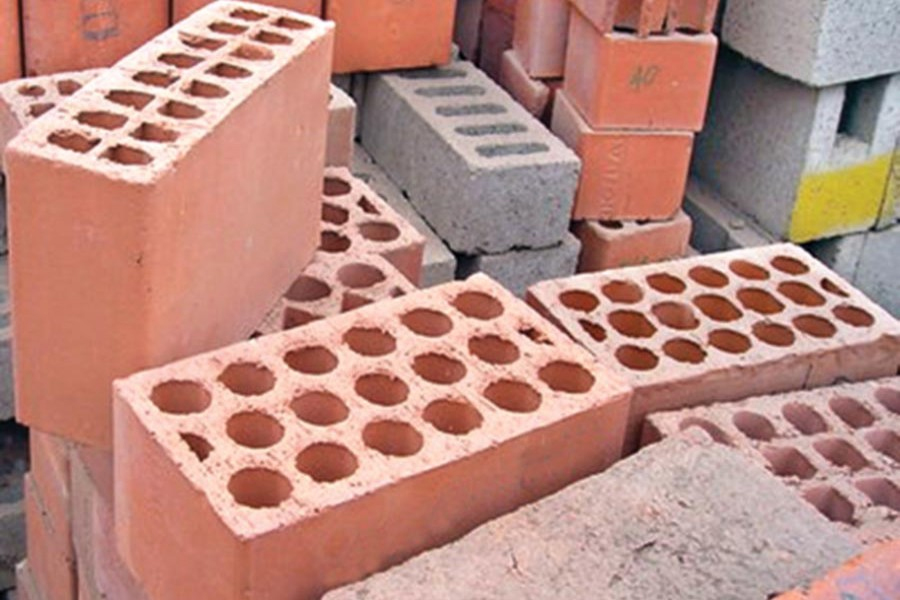Concrete blocks witness robust business growth
Attracting small, new investors besides biggies

Published :
Updated :

Concrete block manufacturing in the country has been witnessing a significant growth in the last several years, thanks to the cost-effectiveness of the environmentally friendly construction material, insiders have said.
Besides, the government has also a specific goal to gradually phase out the use of traditional clay-burnt bricks by 2025 from all public infrastructure development projects, they added.
To grab the opportunities, new businesses are coming into operations while the existing ones are strengthening their capacities.
Currently, over 300 companies including many small ones are operating in the sector - most of them began their journey in the last several years, sources said.
According to them, flourishing the sector is essential as it is connected with achieving several targets of the Sustainable Development Goals (SDGs).
The concrete blocks are a direct alternative to the burnt-clay bricks that require fertile topsoil of agricultural land, causing serious threat to crop output and environment as well as the economy.
A recent research, conducted by the state-run Housing and Building Research Institute (HBRI), revealed that there are around 8,000 operating traditional brick kilns, contributing 1.0 per cent to the country's GDP but destroying 122.5 million metric tonnes of fertile agricultural topsoil.
On the other hand, brick kilns are the largest source of air pollution in Bangladesh, said the HBRI report titled 'Transition Pathway of Traditional Brick Sector towards Non Fired Technology'.
"Therefore, developmental transformation is urgently needed in the brick industry by gradually shifting it towards cleaner processes and efficient technology," the report recommended.
Principal Research Officer of the organisation Nafizur Rahman told the FE that the HBRI has developed different kinds of concrete blocks for different purposes.
Around 30 categories of concrete blocks have been developed that are eco-friendly, cost-effective, light in weight, resistant to earthquakes, as well as fire and salinity retardant, he said.
"A project can save 30-40 per cent of the cost needed for traditional bricks by replacing them with green blocks," he said.
According to sources, different types of blocks include solid blocks, hollow wall block, paving block, and AAC block.
Several hundred companies operate in the country, while the big names include Concord Readymix, BTI Building Products, Hatim Concrete, Mir Concrete and Blocktech Limited.
Faroque Ahmed, an Assistant General Manager at Concord Group of Companies, stressed the need for some government policies such as lowering value added tax (VAT) and import duties on machinery.
The country's people have started accepting the green building products, he added.
"Concord Group has not used clay bricks in any of its projects in the last 20 years," he said. "We hope the use of green building materials will double in the coming years."
Indicating the market potential and urgency of adopting the green materials, Managing Director of Blocktech Limited Shakawat Hossain said the block makers have so far grabbed only five to six per cent of all bricks - or 32 billion pieces of brick altogether - required for the country's construction activities.
Increased use of concrete blocks for multifarious usage is essential for sustainability of our cities.
Traditional brick manufacturing kilns burn about 6.0 million tonnes of coal and emit about 15.67 million tonnes of carbon dioxide per year, he said.
"A mid-sized concrete block factory having two units can produce five times higher number of bricks than that of a clay-burning brick kiln, and use half of land," said Mr Hossain, who is also the President of Bangladesh Concrete Blocks & Pavers Manufacturer Society (BCBPMS).
Hailing the government endeavours to promote the sector, he said the government provides VAT exemption only on hollow blocks and thought that it should be applicable on all concrete blocks.
He also called for raising the loan ceiling up to Tk 100 million for concrete block manufacturers and Tk 500 million for AAC block manufacturers.
saif.febd@gmail.com


 For all latest news, follow The Financial Express Google News channel.
For all latest news, follow The Financial Express Google News channel.